Feb 2017
Wolf's at the door again, this time with Chicago Justice
02/28/17 12:06 PM
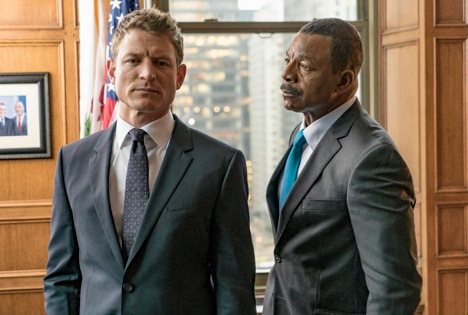
Premiering: Wednesday, March 1st at 9 p.m. (central) before moving to regular Sunday, 9 p.m. slot on March 5th
Starring: Philip Winchester, Carl Weathers, Monica Barbaro, Jon Seda, Joelle Carter
Produced by: Dick Wolf, Michael S. Chernuchin, Matt Olmstead, Derek Haas, Michael Brandt, Arthur Forney, Peter Jankowski
By ED BARK
@unclebarkycom on Twitter
Dick Wolf’s Chicago carousel is starting to make even his old Law & Order franchise a little dizzy.
The most resilient producer in TV history has only Law & Order: SVU remaining from his original churn ‘em out cash cow. But at the height of its powers, Law & Order didn’t have four incarnations on the air all at once. After being presumed dead as a big prime-time powerhouse, the 70-year-old Wolf has re-emerged more prolific than ever on the same network (NBC) that birthed the original Law & Order back in 1990.
He began rebuilding his empire in 2012 with Chicago Fire, which rather unexpectedly became a decent-sized hit. Then came Chicago P.D., Chicago Med and now, Chicago Justice. The city’s sanitation workers might be hopeful, too, at this point. Chicago Garbage may not have a lot of life and death jeopardy. Still, a person’s trash can tell you a lot about them and lead in all kinds of directions.
Justice gets a big springboard on Wednesday, March 1st as the third tier of a “crossover event” that also involves Fire and P.D.. After this “preview,” which NBC inexplicably didn’t make available for review, the newcomer moves to Sundays at 9 p.m. (central), starting on March 5th. This episode, subtitled “Uncertainty Principle,” is the one that was sent to TV critics.
The basic Wolf boiler plate again applies. Rip a little something from the headlines whenever possible. Illustrate with a workmanlike script and act it out with a capable ensemble cast. Be sure to swell the music to hammer home dramatic tension. There’s nothing exceptional to see here, but you could do far worse.
Justice also has a Law & Order gene in play. The overall star of the show, assistant state’s attorney/deputy chief of special prosecutions Peter Stone (Philip Winchester), is the son of New York City district attorney Ben Stone, who was played by Michael Moriarty in the first four seasons of Law & Order. The character might have lasted much longer had Moriarty not had a very public spat with Wolf. There are two basic taboos on Wolf shows. Don’t question his authority or ask for considerably more money. He’ll cut you loose just like that because in his long-held view, a show is always bigger than any single cast member. As the original Law & Order proved again and again.
Sunday’s episode of Justice is built around a young black drug dealer who’s suddenly found dead in jail. The kid’s grieving mother has a no-nonsense ally in a middle-aged white priest who instantly demands a thorough investigation and later turns over a batch of cell phone videos showing the deceased being roughly arrested by veteran black police officer Kevin Atwater (LaRoyce Hawkins).
A grand jury is quick to indict the cop. He used to work the streets with Antonio Dawson (Jon Seda), a former Chicago P.D. regular who’s jumped to Justice and become a chief investigator.
Stone’s boss, Cook County State’s Attorney Mark Jefferies (Carl Weathers), is quick to spout cliches such as “We can expect some sort of public reaction.” So make no mistake, “You gotta get out in front of this immediately.”
Atwater ends up being represented by one of Stone’s old friends and former charter Law & Order character Paul Robinette (Richard Brooks), who spent three seasons on the show. Jason Beghe, currently deployed as P.D. star Henry “Hank” Voight, pops in for a few seconds to snarl, “If Kev killed that sonofabitch, that sonofabitch needed killing.”
Also stirred into this mix are the other two Justice regulars, Assistant State’s Attorney Anna Valdez (Monica Barbaro) and State’s Attorney Investigator Laura Nagel (Joelle Carter), who gets the inevitable “tough as nails” tag in NBC publicity materials.
It all ends with a bit of a twist, which most vigilant viewers should see coming. Weathers’ Jefferies then proclaims, “In the end, the truth emerged victorious.”
The overall victor continues to be Dick Wolf, to whom go the considerable spoils. He still knows how to put together a crisp, concise story, and certainly how to milk a franchise. Chicago Justice, which some also see as something of a lightly camouflaged Law & Order reboot, gives NBC another steady hand that’s also no great shakes. But it’ll do, and Wolf very likely has more where it came from.
GRADE: B-minus
Email comments or questions to: unclebarky@verizon.net
NBC's Taken -- or maybe you'll just as soon leave it
02/27/17 04:22 PM
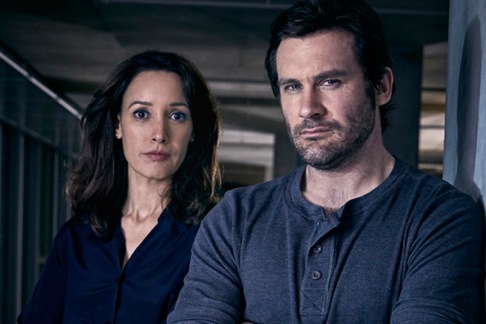
Premiering: Monday, Feb. 27th at 9 p.m. (central) on NBC
Starring: Clive Standen, Jennifer Beals, Gaius Charles, Brooklyn Sudano, Monique Gabriela Curnen, Michael Irby, James Landry Hebert, Jose Pablo Catillo
Produced by: Alexander Cary, Luc Besson, Matthew Gross, Edouard de Vesinne, Thomas Anargyros, Alex Graves
By ED BARK
@unclebarkycom on Twitter
Don’t worry unduly, Vikings fans. Clive Standen hasn’t yet left Rollo behind as History channel’s most successful series ramps up for Season 5. Nor should he -- especially for this.
NBC’s misfiring Taken is billed as a 30-year prequel to the same-named feature film, with Standen stepping in to play ex-Green Beret Bryan Mills while Liam Neeson chills as the character’s older self.
It’s a decidedly odd bit of business, though. The new Taken is set in the present day, even it’s supposedly three decades earlier. Such continuity inconsistencies likely won’t bother viewers who just want to see Mills fire weaponry and throw punches. He does lots of this as the grieving big brother of a sister whose death he hopes to avenge while also battling assorted other terrorists.
Mills, a loose cannon with a thirst for mayhem, is recruited by terse CIA division boss Christina Hart (Jennifer Beals) after he careens through Thursday’s premiere episode. The action is constant, with some guilt-stricken brooding mixed in. Mills, a veteran of three tours of Afghanistan, is targeted by crime boss Carlos Meija (Romano Orzari), who blames him for his son’s death. As part of a planned payback, he takes out our anti-hero’s sister, Cali (Celeste Desjardins), during a melee aboard a train after Mills springs into action upon deducing that something’s amiss.
By Episode 2, he’s already drawing the ire of a team member after going berserk during a training mission. “Something wrong with you, pal. In the head!” Mills is informed. Still, they need him.
The cast includes Gaius Charles, best known for playing “Smash” Williams on NBC’s acclaimed Friday Night Lights. In Taken, he glowers a lot as a team member named John. For relaxation purposes, Mills very slowly unclenches himself in the company of Asha (Brooklyn Sudano), who had been Cali’s best friend. By Episode 4, he’s finally making some progress.
Luc Besson, who produced all three Taken feature films, is also helming the TV version. Neeson is now 64, and there are no current plans for a Taken 4. So NBC’s all aboard, with Standen still a game 35 and already used to all that grimy rough-and-tumble on Vikings.
That’s pretty much what you’ll get, a conveyor belt of death-defying and death-dispensing action scenes. Standen has physicality to burn in a series that pings from one crisis to another. It’s all enough to make the reconstituted team bond over beers at their secret lair after they wipe out a gang of human traffickers in Episode 2.
“I don’t think we could have pulled it off without the new guy,” it’s grudgingly admitted.
I don’t think NBC pulls this one off either. Best to keep your sword sharpened, Clive.
GRADE: C
Email comments or questions to: unclebarky@verizon.net
ABC's triumphant When We Rise reacquaints ABC with its Roots
02/23/17 02:01 PM
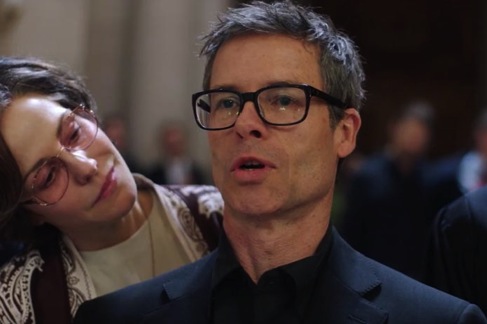
Mary-Louise Parker, Guy Pearce as the older Roma Guy, Cleve Jones. ABC photo
Premiering: Monday, Feb. 27th at 8 p.m. (central) and continuing March 1-3 at the same hour on ABC
Starring: Guy Pearce, Mary-Louise Parker, Rachel Griffiths, Michael K. Williams, Austin P. McKenzie, Emily Skeggs, Fiona Dourif, Jonathan Majors, Ivory Aquino, Sam Jaeger, Rafael de la Fuente, Carrie Preston, Todd Weeks, Phoebe Neidhardt, Gideon Adlon, Charles Socarides, Arliss Howard, Rosie O’Donnell, Whoopi Goldberg, David Hyde Pierce, Phylicia Rashad, Rob Reiner, Richard Schifff, Denis O’Hare
Produced by: Dustin Lance Black, Gus Van Sant, Ted Babcock, Jessika Borsiczky, Bruce Cohen, Tim Iacofano, Laurence Mark
By ED BARK
@unclebarkycom on Twitter
ABC, long ago the network of Roots, boldly strives to make another landmark contribution with the four-part, eight-hour When We Rise.
Mission accomplished -- fully and fearlessly with this sweeping dramatization of the ongoing fight to achieve equal rights for what has become the shorthand LGBT(Q) community. It’s a movement hamstrung by infighting, intransigent lawmakers and extreme physical peril, both from the AIDS epidemic and at the brutal hands of homophobes. When We Rise recaptures it all. And at its center is Cleve Jones (Guy Pearce and Austin P. McKenzie in earlier years), a real-life activist whose gains, setbacks and personal losses are a steady drumbeat throughout.
Principally behind the camera is creator/co-executive producer Dustin Lance Black (Milk, J. Edgar, who wrote the entire screenplay for When We Rise and also directed two episodes. “Now more than ever I feel it is critical that these diverse, long-buried true stories are known,” Black says in a brief note to television critics.
He needn’t say much more and had no idea at the time that President Trump this week would withdraw support of the previous administration’s federal directive that transgender students in public schools be allowed to use bathrooms corresponding with their gender identity. Individual states should decide such matters on their own, according to the new directive.
In that context, it’s also ironic that ABC’s intended four successive nights of When We Rise are being interrupted by President Trump’s prime-time address to Congress on Tuesday, Feb. 28th. The miniseries now will skip that night and resume on Wednesday through Friday of next week.
Those who contend that TV critics should keep politics out of their reviews have no standing in regard to When We Rise. It’s constantly about politics and protest, whether at the local, state or national levels.
In succession, Presidents Reagan, George H.W. Bush, Bill Clinton, George W. Bush and Barack Obama are seen through the prism of archival news footage. Their actions or, for the most part, inactions, are part and parcel of a story that begins in 1972 and stretches through 2013, when the U.S. Supreme Court ruled on the constitutionality of California’s Prop 8, which reversed the state Supreme Court’s earlier allowance of same-sex marriages. Yes, it can get complicated. But When We Rise crisply chops through these thickets while also telling the very human stories of Cleve Jones and three other primary characters.
Ken Jones (Michael K. Williams/Jonathan Majors) is a gay African-American veteran of three Vietnam deployments. Roma Guy (Mary-Louise Parker/Emily Skeggs) and Diane (Rachel Griffiths/Fiona Dourif) are lesbian activists who also become parents of a growingly rebellious daughter born via artificial insemination. Williams, Parker and Griffiths don’t begin their older adult performances until Thursday’s two-hour Part 3. But Pearce is seen from the very start as Cleve, circa 2006 at his Palm Springs home. He’s also the primary narrative voice during the miniseries’ backtrack to Cleve’s formative years, which is where McKenzie’s portrayal comes in.
When We Rise is dotted by contributions from other familiar faces, some in cameos and others making more substantive but still limited contributions. The roll call includes Whoopi Goldberg and Rosie O’Donnell (both as San Francisco-based lesbian activists); David Hyde Pierce (Cleve’s recalcitrant doctor father); Phylicia Rashad (a church pastor supportive of gay civil rights); Rob Reiner (a naysaying but ineffectual court “expert”); and Richard Schiff (a judge).
Lesser known actors have pivotal supporting roles. Sam Jaeger plays Ken’s partner, Richard, and Rafael de la Fuente is Cleve’s lover, Ricardo. Down the stretch, Arliss Howard makes an instantly strong impression as conservative lawyer Ted Olson, who was George W. Bush’s solicitor general but came to believe that same sex marriage is a constitutional right. Gideon Adlon and Phoebe Neidhardt also are impressive in various stages of Roma and Diane’s daughter, Annie.
ABC, with broadcast network constraints in play, is not shy about depicting same-sex kissing, sometimes at length. But nudity remains a taboo, and that includes even any brief glimpses of an unadorned posterior. The language is also devoid of profanity.
Many advertisers likely will sit this one out anyway. When We Rise remains a courageous venture, particularly on the part of a network that’s owned by the Walt Disney Company. NBC entertainment chairman Robert Greenblatt is openly and at times outspokenly gay. But it’s ABC stepping to the fore while the Peacock indulges Greenblatt’s interest in yearly live musicals. On Monday night, he’s very vigorously counter-programming with a two-hour Season 12 premiere of The Voice followed by the launch of NBC’s heavily promoted series continuation of the hit movie franchise Taken.
It’s tough to be an unexpected hit, as Roots was, under such circumstances. But in this view, When We Rise is the 2016-17 TV season’s Program of the Year. Led by sterling performances from Pearce and Williams, it’s a masterwork that generates empathy while building momentum via a compelling story rich in human and legal complexities.
Cleve Jones and Ben Jones were far from being saints. They sometimes succumbed to their excesses and lesser selves, as do we all. But in the end -- and it’s hard to imagine many dry eyes from viewers who steer the entire course -- their struggles help lead the way to equality in at least the nation’s prevailing legal sense of the word.
Many still disagree and some will see this as strictly the devil’s work. That’s their right, and, from this perspective, also their problem. When We Rise is an enriching, bonafide TV event of the first order and also powerful enough to change more than a few entrenched minds. Bravo to ABC, for unflinchingly standing behind it. You don’t have to watch. But really, you should.
GRADE: A
Email comments or questions to: unclebarky@verizon.net
What would Trump do without his enemies of the people -- or they without him?
02/22/17 10:26 AM

By ED BARK
@unclebarkycom on Twitter
No one needs and feeds off the “enemy of the American People” more than the man who designated certain TV networks and a newspaper as such.
And in fairness, they may need him even more.
President Trump recently went “full Mussolini,” as former pal and now antagonist Joe Scarborough put it this week, with a Tweet that seemed to put the First Amendment in his crosshairs. Here’s exactly how it read, with Trump’s caps included: “The FAKE NEWS media (failing @nytimes, @NBCNews, @ABC, @CBS,@CNN) is not my enemy, it is the enemy of the American People!”
In other words, all were found guilty of reporting something Trump didn’t like. Or perhaps it was the “tone.” Because all is rather quickly forgiven if you say something nice about this very thin-skinned leader of the free world. He’ll then lick you like a puppy dog.
Some among the President’s five singled-out enemies of the people are taking offense publicly while perhaps privately rubbing their hands with glee. Why? Trump has been very good for their bottom lines.
The “failing” New York Times, for instance. In last year’s fourth quarter (October to December), the newspaper reported its biggest digital subscriber increase in five years. Trump’s frequent diatribes against the NYT, usually via Tweets since he became President, are a wealth of free advertising. Or “click bait,” if you prefer. Supporters and adversaries alike want to see the latest. The newspaper clearly is not in Trump’s corner. This is an indisputable fact. But Trump’s return fire, always accompanied by the word “failing,” doesn’t hurt even a little bit. On the contrary, it only further builds the brand. The far less-maligned Washington Post should be so lucky.
How about CNN, television’s prime repository of “fake news” in Trump’s view. After enabling his candidacy by carrying virtually every utterance during the primary campaign, the granddaddy of cable’s 24-hour news networks has shifted to more of an attack mode, perhaps in part out of guilty atonement. Trump claims to “never watch” CNN, but has an uncanny ability to criticize what he doesn’t see. According to Nielsen Media Research, CNN enjoyed a 54 percent increase in total day viewership in 2016 as compared to 2015. Its Monday through Friday prime-time performance was even better -- up 77 percent from year-to-year.
The increases were stronger in the key advertiser target audience for news programming, 25-to-54-year-olds. The “fake news” network was up 56 percent in total day viewership and 80 percent in weeknight prime-time.
Trump’s house organ, the Fox News Channel, had far lesser year-to-year increases, paced by a 36 percent boost in 25-to-54-year-olds for its prime-time fare. MSNBC, part of NBC Universal’s news division and thereby included in the President’s enemy of the people slam-banger, enjoyed the biggest increases of all. They included a 132 percent boost among 25-to-54-year-olds for MSNBC’s prime-time menu. MSNBC is still running third in the cable news network ratings, behind FNC and CNN. But both enemies of the people gained ground on FNC during the long-and-winding 2016 presidential campaign.
Saturday Night Live, which actually does do “fake news,” isn’t part of NBC’s news division. But the “totally biased, not funny” show, according to one of several anti-SNL Trump tweets, so far is drawing its largest audiences since the 1994-’95 TV season. The most recent first-run SNL episode, hosted by Trump impersonator Alec Baldwin on Feb. 11th, had the highest ratings for an individual show since Oct. 19, 2008, when Baldwin, Sarah Palin and Tina Fey all made guest appearances.
CBS is in similar straits -- and loving every minute of it. Late Show with Stephen Colbert is not part of the news division either. But it’s been on a prolonged ratings surge during Trump’s presidency, beating onetime kingpin Jimmy Fallon’s Tonight Show for three consecutive weeks in total viewers although still trailing by increasingly smaller margins among advertiser-prized 18-to-49-year-olds.
Colbert has been pounding away at Trump for months, and without making that much headway during the presidential campaign. But since Trump became President, the host in essence has become late night television’s voice of the loud and dogged resistance. Fallon in comparison still makes nice after being pilloried by many for playfully ruffling Trump’s hair during his most recent appearance on the Tonight Show. But Colbert shreds Trump at the start of every Late Show. And he’s finally gained traction while Fallon’s wheels spin.
As for the fifth enemy of the people, well, ABC News is doing just fine lately. World News Tonight currently ranks No. 1 in total viewers, with the NBC Nightly News (a fellow enemy) just a bit behind. The two networks trade places among 25-to-54-year-olds, with the Nightly News having a small advantage.
So here’s the messy truth, which also happens to be a same-named CNN show hosted periodically by Trump adversary Van Jones.
The President’s enemies of the people would be true enemies of his only if they all somehow agreed to declare a moratorium on Trump coverage for perhaps a week. Trump has two cravings above all others -- attention and adulation. They’re coupled with a persecution complex and an insistence on controlling everything. Imagine if his enemies all of a sudden covered everything except Trump. It would drive him crazier than many think he already is. WHERE ARE MY ENEMIES? WHY HAVE THEY FORSAKEN ME?
On the other hand, you can’t just stop covering the President of the United States. So a moratorium is out of the question and always will be. In reality, though, where would The New York Times, CNN, ABC, NBC and CBS be without Trump -- both on the news and entertainment fronts? Almost without question, they’d all be in worse shape financially. And Colbert certainly wouldn’t be on the surge he’s currently enjoying. Don’t even think about taking away his Trump toy. He’d sooner lose a toe.
So yes, the First Amendment must be protected from Trump’s dictatorial bent. But those on his silly “enemy of the American people” list aren’t fighting only to preserve the foundation of democracy. Trump has also been their cash cow. And what CBS chairman Leslie Moonves said a year ago -- and now wishes he hadn’t -- is still perhaps the messiest truth of all.
Trump’s candidacy “may not be good for America, but it’s damn good for CBS,” Moonves proclaimed at the Morgan Stanley Technology, Media & Telcom Conference in San Francisco.
The campaign is a “circus,” he added, but “Donald’s place in this election is a good thing . . . The money’s rolling in and this is fun. I’ve never seen anything like this, and this is going to be a very good year for us. Sorry. It’s a terrible thing to say. But bring it on, Donald. Keep going.”
Boy, has he ever.
Email comments or questions to: unclebarky@verizon.net
A hard-knocks but poetic life for the ages in PBS' Maya Angelou: And Still I Rise
02/21/17 09:14 AM
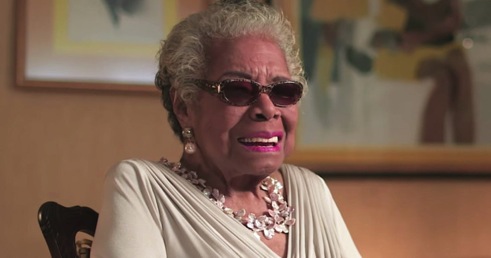
By ED BARK
@unclebarkycom on Twitter
Poet, autobiographer, activist, actress, singer, dancer, survivor -- and so on.
Maya Angelou’s life was an amazing tour de force of stellar accomplishments borne of nearly debilitating setbacks and deprivations. PBS’ Maya Angelou: And Still I Rise, premiering on Tuesday, Feb. 21st (7 to 9 p.m. central on KERA13 locally), is an overdue celebration and commemoration. She died at age 86 on May 28, 2014, but remains of strong voice via the exclusive interviews conducted for this two-hour documentary.
Filmmakers Rita Coburn Whack and Bob Hercules have much ground to cover and make a Herculean effort to cover it all under the banner of PBS’ prestigious American Masters series. Angelou, best known for her landmark 1969 memoir I Know Why the Caged Bird Sings, seems to remember her entire life as though it were yesterday.
One of her most vivid early recollections, from a childhood in Stamps, Arkansas, is of hiding the partially paralyzed Uncle Willie in a bin full of potatoes and onions after the Ku Klux Klan was rumored to be riding in. He otherwise sternly taught the then Marguerite Annie Johnson and her older brother, Bailey, their multiplication tables.
The two children got passed around by their parents, first to live with their paternal grandmother in Stamps and then to St. Louis to be reunited with their divorced mother. Angelou recalls being raped at age seven by her mother’s boyfriend, who spent just a day in jail before being freed and then found murdered. The child blamed her voice for uttering her assailant’s name and thereby causing his death. So she stopped talking for the next five years and didn’t speak again until a teacher and friend of the family told her that a newfound love of poetry could only be fully appreciated by reciting the words. By that time she had been sent back to Stamps again as basically unwanted baggage.
“When I decided to speak, I had a lot to say,” Angelou recollects.
Eventually sent back to her mother, who now was living in Oakland, Angelou had her only child, a son named Guy, after an impulsive, onetime sexual encounter. A teen at the time, she had become long-legged, six feet tall and for a short period a table dancer and prostitute. The name Maya took hold after she became a professional calypso dancer of note, recording the album Miss Calypso and also appearing in the 1957 movie Calypso Heat Wave. During those days she also married and divorced the first of her three husbands, a Greek named Tosh Angelos.
“My mother has not had the good fortune to have love that lasts a long time,” Angelou’s son, Guy, says diplomatically.
“I’ve always been a patsy for men who could think,” says Angelou, referring to a second marriage to Vusumzi Make, a decidedly plus-sized South African political activist and wheeler-dealer.
Some accounts say they were never officially betrothed. But in the PBS film, Angelou narrates what she wrote about the dissolution: “We had worn our marriage threadbare, and it was time to discard it. I knew that other women would be in that house before the sheets lost my body’s heat.”
She was an activist at this point, establishing close ties with a Mount Rushmore of towering freedom fighters. The Rev. Martin Luther King, Jr., Malcolm X and James Baldwin all had her ear -- and vice versa. When King was assassinated in 1968, “it just knocked me out and I fell into mutism again,” Angelou says.
But this opened a door when Baldwin came calling and demanded that she pull herself out of seclusion and join him at a party being given by cartoonist/satirist Jules Feiffer and his wife, Judith. Upon hearing some of the stories from Angelou’s childhood, Judith contacted Random House editor Robert Loomis and told him of her find. He kept cajoling and finally persuaded her to write a memoir of her early years. It became I know Why the Caged Bird Sings.
Both Loomis and Jules Feiffer contribute new interviews to the film, which also includes recollections and appreciations from Bill and Hillary Clinton, Oprah Winfrey, Cicely Tyson, Alfre Woodard, Lou Gossett Jr. and Quincy Jones. Angelou came to new prominence in 1993, when Bill Clinton asked her to write and orate a new poem for his presidential inauguration.
“I knew she’d make an impression,” he says. “She was big and she had the voice of God.” Angelou called the poem “On the Pulse of Morning.” And in Clinton’s view, “it’ll read well a hundred years from now.”
In later years, Angelou became a vocal arch enemy of the n-word, terming it “poison” and unfit for use by any race. “No, no, no, no, no, it’s vulgar,” she says during a latter day speaking engagement included in the film.
There’s much more to be seen and heard in And I Shall Rise, which deploys a treasure trove of archival footage and still photography in tracking Angelou’s incredible life and transformations. Her son, Guy, is not shy about expressing his views, even if they’re sometimes not based entirely on fact. He’s most memorable at the end of a story on how his mother was denied work as an understudy to Pearl Bailey in an all-black Broadway version of Hello, Dolly! after the star supposedly vetoed her as too big and ugly. It deprived her of a chance to settle in New York City and be with him for a full year, he recounts.
Thirty-five years later, according to Guy’s emphatic recollection, Bailey received a lifetime achievement award (from the Screen Actors Guild), and asked Angelou to present it. “And guess who gave it to her, and never said a damn thing!” he exclaims, nearly spitting out the words while choking up.
In reality, Bailey’s earliest appearance in Hello, Dolly! came in 1968. She received the lifetime achievement award just eight years later, in 1976 -- and died in 1990. So if the anecdote is true, the timeline is way off. Whatever the case, the filmmakers should have double-checked rather than let the “35 years later” claim stand on its own.
This is relatively minor in the grand scheme of things, although it does give some pause, particularly regarding Guy’s contributions. The progression of events also can be a bit jumbled at times. They include Angelou’s third and final marriage, to Britisher Paul du Feu, who previously had been wed to noted feminist Germaine Greer. “He had a tendency to drink -- to his fill,” Guy says. After nine years it was over, to the shock of longtime friends such as Tyson, who viewed their relationship as the “most compatible” of all.
And Still I Rise mostly soars, though, on the wings of Maya Angelou’s own words and recollections. She lived a multifaceted life for the ages, overcoming a wealth of indignities while also rising above her own considerable faults and frailties.
Woodard, who starred in the Angelou-directed 1998 film Down in the Delta, marvels in the end at the contributions and legacy of a pathfinder who remained vital, lucid and indomitable until the very end.
“Man, the curtain going down on that act,” she says of Angelou. “Thank God I got to live in that time.”
GRADE: A-minus
Email comments or questions to: unclebarky@verizon.net
HBO's Crashing: a "small" comedy that measures up
02/19/17 10:09 AM
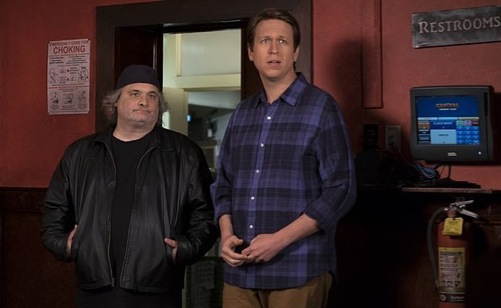
Premiering: Sunday, Feb. 19th at 9:30 p.m. (central) on HBO
Starring: Pete Holmes, Lauren Lapkus, George Basil
Produced by: Judd Apatow, Pete Holmes, Dave Rath, Josh Church, Igor Srubshchik
By ED BARK
@unclebarkycom on Twitter
A fairly gainful comic in real life, Pete Holmes plays himself in sad sack mode as the star of HBO’s Crashing.
His pathetic strivings are made even more so when his erstwhile supportive wife, Jess (Lauren Lapkus), decides to junk him and take up with a cosmic, tattooed dude named Leif (George Basil). Still, Pete’s a haplessly optimistic gamer who can take a knockdown punch. And as Crashing evolves (HBO made the first six episodes available for review), he grows in appeal as a babe in the New York City jungle who ends up depending on the kindness of fellow, far more successful stand ups.
Judd Apatow, principal co-executive producer of the series along with Holmes, has also teamed with Lena Dunham for Girls’, which now is nearing the end of its long HBO run. The two comedies are paired on Sundays from 9 to 10 p.m. (central), with Crashing a gentle lamb compared to all the attendant on- and off-camera drama that’s surrounded Girls from the start.
The premiere episode finds Jess urging Pete to have more inventive and spontaneous sex with her. But the product of a Christian school and rigid but loving parents cannot bring himself to take a sexual position that pairs the numbers six and nine.
“I don’t like doing two things at once,” Pete protests, comparing it to “playing the banjo while riding a bicycle.” Besides, he has to run off to the city again for a chance to do a few minutes of standup at a crummy comedy club that doesn’t pay him but does enforce a two-drink minimum whether you’re onstage or in the sparse audience. Pete’s livin’ the dream, though, while his employed wife pays the bills. But the title Crashing soon will have a double-meaning, neither of them in the cuckolded Pete’s favor. His life has crash-landed and he’s crashing in various apartments inhabited by comedians playing themselves.
Super slovenly Artie Lange is Pete’s first ad hoc benefactor, followed by T.J. Miller, a batch of fellow unknown stand ups and, in Episode 6, Sarah Silverman. This is also where Pete’s running-in-place “career” finally catches a break after a dispiriting and payless stint as a leaflet-distributing “barker.” Lure five patrons to Manhattan’s struggling and ill-named Boston comedy club (mostly with phony come-ons about big stars showing up) and get a few minutes onstage in return.
Pete’s comedy is “clean” and still very formative. But it’s not without a good riff or two. He’s greeted with a few, face-saving titters in Episode 1, (from a “crowd” of perhaps 10) after wondering what the employee discount might be at The Dollar Store. “You think it’s just ‘Take it?’ “
In Episode 4, a “barking” Pete scores with a throwaway line: “There’s no good way to tell people you haven’t seen The Wire.” Episode 5, the strongest so far, is built around Pete still trying to keep the split-up a secret from his parents, with Jess playing along for a while when they visit the city to celebrate mom’s birthday.
Crashing has enough mostly gentle amusements to keep it on track. And it’s increasingly easy to get on Pete’s side. He’s possibly more unbreakable than even Netflix’s sun shiny Kimmy Schmidt. Is he going to make it after all? The closing scene in Episode 6 marks a small victory in that direction. But for Pete, it’s like climbing a mountain. One can feel his immense relief -- and also enjoy sharing it.
GRADE: B+
Email comments or questions to: unclebarky@verizon.net
The Good Fight comes out punching in Round One for CBS All Access
02/17/17 11:13 AM

Premiering: Sunday, Feb. 19th at 7 p.m. (central) on CBS and CBS All Access
Starring: Christine Baranski, Cush Jumbo, Rose Leslie, Delroy Lindo, Erica Tazel, Sarah Steele, Justin Bartha
Produced by: Michelle King, Robert King, Phil Alden Robinson, Ridley Scott, David Zucker, Liz Glotzer, Brooke Kennedy, Alison Cross
By ED BARK
@unclebarkycom on Twitter
Lately there’s no such thing as a free, new top quality drama on CBS. Instead you’ll have to pay for it.
The network’s recently launched streaming service, CBS All Access, gets serious this Sunday with its first original series. The Good Fight, a continuation of its much-lauded The Good Wife, puts Christine Baranski at center stage in place of Julianna Margulies, who leaves the scene after seven seasons and two Emmy awards in her leading role of Alicia Florrick.
The CBS broadcast network will air The Good Fight’s first episode before it moves exclusively to the subscription All Access for Season One’s remaining nine hours. They’ll be doled out once weekly on Sundays, which puts All Access in alignment with Hulu while Netflix and Amazon Prime continue to offer their original series in full season gulps.
Baranski earned six Emmy nominations but has yet to get a win for her portrayal of hard-driving attorney Diane Lockhart. Episode One, subtitled “Inauguration,” briefly shows her in a seeming traumatized state as Donald Trump is sworn in as President. It spurs her to pre-purchase a luxurious villa and retire from her senior partnership at Chicago’s Lockhart, Decker, Gussman, Lee, Lyman (we’re not finished yet), Gilbert-Lurie, Kagan, Tannebaum & Associates.
Alas, her nest egg is quickly wiped out by a Ponzi scheme that implicates Henry and Lenore Rindell (guest stars Paul Guilfoyle, Bernadette Peters), and by implication their innocent daughter Maia (new cast member Rose Leslie). She’s just joined Lockhart, Decker, Gussman et. al. after passing the Illinois bar exam. But Diane, who’s Maia’s godmother, is coldly rebuked when she asks to be taken back, only to be taken aback. No. 1, she’s too pricey. Secondly, she directed some of her clients to the Rindells -- and that didn’t end well.
So that’s the setup for a reset, with a rebuked and uncommonly weepy Diane (in a scene with her estranged husband) eventually accepting the life preserver offered by a rival firm of mostly African-American lawyers. She can be both a partner and “a diversity hire,” says attorney Adrian Boseman (Delroy Lindo). This amuses both of them.
Diane also will be newly in business with the firm’s founding partner, Barbara Kolstad (Erica Tazel), and Lucca Quinn (Cush Jumbo carrying over from the last season of The Good Wife). Maia likewise is brought on board after getting almost immediately dumped by Diane’s old firm.
CBS made the first two episodes available for review, and they’re both pretty terrific. The dialogue crackles and the first featured case (in Episode 2) is buoyed by a guest appearance from Christine Lahti (Chicago Hope) as a very self-assured prosecutor.
Among the regular cast members, the immensely under-recognized Lindo instantly registers as the suave Boseman while Jumbo is a commanding presence in her holdover role. Baranski also remains first-rate in what’s become her defining TV role.
Absent any restraints from advertisers, The Good Fight has mixed in some f-bombs (which obviously will be excised from Sunday’s lone showing on regular old CBS). Episode 2 puts Maia on the jarring receiving end, with bilked investors still hating on her via a barrage of very pointed text and voice mail messages. This one also ends with a jolt.
CBS obviously wants to entice viewers to buy into All Access by giving them something worth investing in. The Good Fight is enticing bait, although it’s a shame that the broadcast network hasn’t come close to measuring up in recent seasons with a string of standard-issue new dramas, most in the crime-solving genre and none in any danger of receiving an Emmy nomination.
All Access also has the new Star Trek: Discovery in production, although creative problems have delayed its debut. In future years, will most if not all of the “good stuff,” such as The Good Fight, wind up on All Access instead of CBS? That’s a distinct and somewhat disheartening possibility in times when the old-line Big Four broadcast networks increasingly are hard-pressed to compete -- not only with their own pay-for-play creations but with the aforementioned established streamers plus high-caliber cable networks such as FX, HBO and AMC.
More than ever, you get what you pay for.
GRADE: B+
Email comments or questions to: unclebarky@verizon.net
HBO's Big Little Lies: all-star angst amid a dangled double mystery
02/16/17 09:35 AM
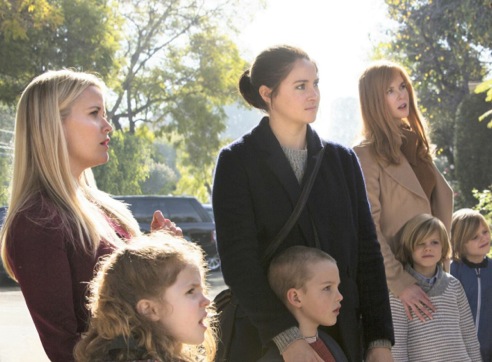
Premiering: Sunday, Feb. 19th at 8 p.m. (central) on HBO
Starring: Reese Witherspoon, Nicole Kidman, Shailene Woodley, Alexander Skarsgard, Laura Dern, Adam Scott, Zoe Kravitz, James Tupper, Kathryn Newton, Jeffrey Nordling, Iain Armitage, Darby Camp, Cameron Crovetti, Nicholas Crovetti, Ivy George, Santiago Cabrera
Produced by: David E. Kelley, Reese Witherspoon, Nicole Kidman, Barbara A. Hall, Gregg Feinberg, Bruna Papandrea, Nathan Ross, Per Saari, Jean-Marc Vallee
By ED BARK
@unclebarkycom on Twitter
Ample wine is consumed, but the glasses figuratively are half-empty in HBO’s very moody and sometimes draining Big Little Lies.
Adapted from the bestselling, same-named 2014 novel by Liane Moriarty, it’s a star vehicle for Reese Witherspoon and Nicole Kidman, who also are co-executive producers with TV vet David E. Kelley (Ally McBeal, Boston Public and Amazon’s recent Goliath). They’ve fashioned a seven-episode miniseries coated with thick layers of unfulfillment for the outwardly pampered and privileged women of Monterey, CA. Three of them live in ocean view splendor while a fourth principal hunkers down in a comparative hovel after migrating from Santa Cruz in hopes of starting a new life. The entire miniseries is directed by Jean-Marc Vallee, whose most notable feature films to date are the multiple Oscar-winning Dallas Buyers Club and Wild, for which Witherspoon received an acting nomination.
Big Little Lies also is a murder mystery -- not only whodunit but to whom they did it. An opening crime scene at a gala school fundraiser sets that particular stage before one of the drama’s recurring Greek chorus of sniping gossipers asserts that “at the root of it all was Madeline McKenzie.”
That’s Witherspoon’s character, a loud and willful bundle of nerves with a balky teen daughter named Abby (Kathryn Newton) from a previous marriage and six-year-old Chloe (Darby Camp) from a current one.
Kidman plays her best friend, Celeste Wright, who’s married to the constantly traveling but possessive Perry Wright (Alexander Skarsgard from True Blood). Skarsgard’s not a vampire this time, but he’s slowly draining the life out of Celeste with his physical and recurrently violent demands. It’s been something of a sexual turn-on for both of them, but Celeste is starting to realize the self-destructive and dangerous course they’re on. Perry otherwise is a benign daddy to their twin sons, Max and Josh (Nicholas and Cameron Crovetti), sending them into giggles with his impressions of a flesh-eating monster. Oh, the symbolism.
The newcomer is Jane Chapman (Shailene Woodley), whose little son, Ziggy (Iain Armitage), was born after she was sexually assaulted and raped. Madeline and Celeste quickly bond with her, and the three regularly have coffee together at an oceanside cafe.
Fourth wheel Renata Klein (Laura Dern) is a prosperous businesswoman with a little girl named Annabella (Ivy George) and a husband, Gordon (Jeffrey Nordling), who endures her verbal volatility while also trying to tame it. All of the little kids are first-graders. And after just the first day of class, Annabella emerges with a bruise on her neck and fingers the new kid, Ziggy, as the bullying perpetrator. He emphatically denies doing anything, but the die is cast and the resentments escalate.
Big Little Lies regularly returns to the scene of the crime and rounds of backbiting from other, otherwise mostly unidentified parents. One tells the cops, “Nobody knows nothin’ about anybody. You can write that down, detective, and underline it.”
Those who have read Moriarty’s book know the identities of both the victim and the perpetrator. But there’s no guarantee that Kelley’s adaptation will stick to this particular script. Only the seventh and climactic episode has been held back by HBO. Throughout the first six hours made available for review, no answers are forthcoming, with things running in place more than they should.
Big Little Lies also can be too much of a treatise at times, bogging down instead of building momentum with its multitude of principal and supporting characters. They also include Madeline’s slowly festering husband, Ed (Adam Scott); her ex-husband, Nathan (James Tupper); his second wife, Bonnie (Zoe Kravitz); and community theater director Joseph Bachman (Santiago Cabrera). Yes, there’s also a subplot in which Madeline strives to strong-arm the adult puppet drama Avenue Q into production against opposition from a “decency” brigade led by Dern’s Renata.
Witherspoon gives the showiest performance as Madeline. “I can’t even keep track of all the fights you start,” says husband Ed, suggesting there should be an app for that.
Kidman is most effective in prolonged scenes with her therapist, during which she progresses from denial to a growing self-awareness. But the most affecting performance is by Woodley as Jane, who’s lovingly raised her son while also battling her demons. Jane also is more relatable as a mom making do without attendant creature comforts while her newfound friends live lifestyles of the rich if not famous.
Whatever its denouement, Big Little Lies isn’t stitched tightly enough to be a truly great miniseries. Its teachable moments tend to be worn like signboards, with the preachments piling up while the overriding double mystery keeps getting dangled like a piñata hung too high for all those first-grader to reach. Although billed by HBO as a “darkly comedic drama,” none of it is much if any fun to watch. So don’t think Desperate Housewives. If you do, you’ll be disappointed.
GRADE: B
Email comments or questions to: unclebarky@verizon.net
Doubt bounces Katherine Heigl over to CBS
02/14/17 02:05 PM
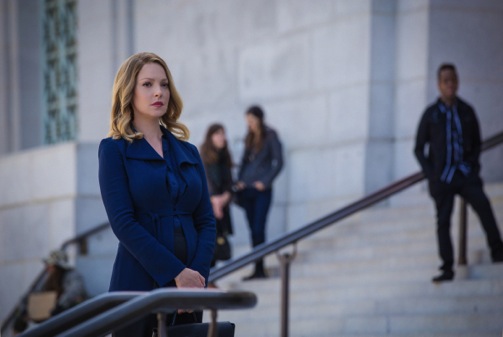
Premiering: Wednesday, Feb. 15th at 9 p.m. (central) on CBS
Starring: Katherine Heigl, Dule Hill, Elliott Gould, Laverne Cox, Steven Pasquale, Dreama Walker, Kobi Libii, Judith Light
Produced by: Tony Phelan, Joan Rater, Carl Beverly, Sarah Timberman
By ED BARK
@unclebarkycom on Twitter
Here comes Katherine Heigl again.
All hasn’t gone as planned since she left Grey’s Anatomy in 2010 with the idea of becoming a movie star. Grey’s remains gainfully deployed on ABC while Heigl since has been in a pile of pedestrian, barely seen feature films (Jackie & Ryan, Home Sweet Hell, Jenny’s Wedding, etc.) while also fronting NBC’s quickly canceled State of Affairs during the 2014-’15 TV season.
Heigl also has publicly let it be known she’d happily return to Grey’s for a limited arc as her old character, Izzie Stevens, for which she won an Emmy. But all-business show runner Shonda Rhimes is not known as a forgiver or a forgetter after Heigl’s less than amicable departure. So nothing’s materialized.
Now that the E! True Hollywood Story portion is out of the way, let’s get to Heigl’s latest go-around. She’s starring as defense lawyer Sadie Ellis in CBS’ Doubt, which is replacing Code Black.
As with State of Affairs, there’s a serial storyline in play but no guarantee it will get resolved. Heigl’s NBC drama ended with an open-ended cliffhanger after 13 episodes. Sorry, viewers, but feel free to write your own storylines from here on out.
In Doubt, Heigl’s Sadie is representing cute pediatrician Billy Brennan (Steven Pasquale), who’s newly accused of murdering his girlfriend 24 years ago when he was a teenager. Billy and Sadie also have become lovers, which makes his guilt or innocence of more than passing importance. Throughout the first two episodes, and another out-of-sequence hour made available for review, Billy seems to have the evidence on his side -- until he doesn’t. But then he does again. And doesn’t.
The show’s New York City-based, “boutique” law firm otherwise is well-stocked with familiar TV faces. Dule Hill (The West Wing, Psych) plays Albert Cobb, who’s Sadie’s best friend and trusted colleague. Laverne Cox, fresh from Orange Is the New Black, is transgender attorney Cameron Wirth. And Elliott Gould is firm founder Isaiah Roth, who’s also Sadie’s father. Everyone seems to revere him. So it’s snap to it time when he says, “OK. Go, do, conquer” near the start of Episode 2.
Tiffany Simon (Dreama Walker), one of the firm’s newer arrivals, is broadly and ridiculously drawn as an import from the milk-fed Midwest who keeps admonishing herself for being so damned “normal.”
“I’m from Iowa. We don’t yell. We seethe,” she says in Wednesday’s premiere after feeing guilty for loudly expressing her opinion. In Episode 2, Tiffany still finds it disconcerting that “We actually had a white picket fence” back home.
There’s also Nick Brady (Kobi Libii), a felon who earned his law degree while incarcerated and is now trying to make his mark when he’s not getting sloughed off.
Steady doses of highly generic mood music tend to kick in whenever the lawyers are supposed to be bantering amusingly. The sub-plot cases range from a diagnosed schizophrenic who’s accused of murder and freaks out on the witness stand (“Control your client!”) to a cantankerous former judge and friend of Isaiah’s who’s charged with abusing his Alzheimer’s-afflicted wife by having sex with her.
Judith Light, who’s terrific in Amazon’s Transparent series and was a sneering hoot in TNT’s Dallas reboot, has a recurring role as the incarcerated Carolyn Rice, who’s also Sadie’s mother. Light brings a convincing, cutting edge to her brief but powerful scenes with both Heigl and Gould.
Doubt is the kind of series where answers are left hanging at commercial breaks and where preachments tend to run thick. All three episodes made available for review have thoroughly predictable outcomes for the sub-cases while the pot keeps percolating between Sadie and her Dr. Billy.
Cox, as attorney Wirth, is given ample time in courtroom scenes while also getting a chance to briefly declare, “I’m a woman, but I used to be a man.” Hill’s attorney Cobb admonishes and advises Sadie but relies on couples’ therapy to sort out whether it’s possible for him to have an enduring relationship with his on-and-off girlfriend. Gould’s patriarchal Isaiah seems out of sync in the opening hour but shows signs of gaining his bearings in upcoming episodes.
All in all, though, Doubt is a Heigl-driven vehicle, and perhaps the last she’ll get for a while if this one can’t find an audience. So far it’s strictly so-so on the storytelling front, but with some scenes that raise the bar beyond that. Those mostly involve Light, though. And she’s not the one who’s supposed to carry the load.
GRADE: C+
Tower deftly animates a University of Texas tragedy
02/14/17 09:50 AM

A Good Samaritan rushes to the aide of a wounded pregnant woman in Tower. The documentary film mixes animation and actual footage. PBS photo
By ED BARK
@unclebarkycom on Twitter
Valentine’s Day isn’t an optimum spot for the TV premiere of a very different look at the University of Texas Tower shooting, in which 16 people ended up dead, including the assailant’s mother and wife.
Activating your preferred recording device might be a better approach. Because Tower is a film well worth seeing, both for its novel blend of animation and real-life footage and the eyewitness stories recounted 50-and-a-half years after the Aug. 1, 1966 mass murders.
Running for just under one hour, 20 minutes and airing under the Independent Lens banner, Tower premieres at 9 p.m. central on (KERA13 in D-FW). The director is Keith Maitland, who financed the film via the Indiegogo crowdsourcing website before receiving $70,000 in matching funds from University of Texas alumni.
Maitland deploys what’s called “rotoscopic” animation to depict Tower’s main characters. But the end result is neither cartoonish nor laughable. Archival news footage is also used fairly extensively. And in the closing portion, Tower has current-day interviews with some of the surviving key participants.
Going unseen is the Tower shooter, 25-year-old ex-Marine Charles Whitman. The only exception is a magazine picture of him as a three-year-old balancing himself with rifles held in both hands while standing next to a dog. It’s shown near film’s end as a bridge to forgiveness from Claire Wilson James, who was pregnant on that day and lost both her baby and her boyfriend to Whitman’s bullets. “How can I hate somebody like that?” she asks in reference to his innocence lost.
The telescoped focus is on the victims, survivors and those who worked their way to the tower’s 28th floor to kill Whitman. Roughly 10 minutes of Tower have been cut from its premiere at last year’s South by Southwest film festival in Austin. Whatever edits were made, there’s no Whitman “back story” in the television version. Could it use one? Yes, although just a few minutes would suffice. His killing spree is billed as “the nation’s first mass school shooting.” So even a very cursory look at Whitman’s formative years would help to put that very grim day into context. Otherwise, there’s always Wikipedia.
Tower takes a minute-by-minute approach to Aug. 1, 1966, with KTBC-TV/radio reporter Neal Spelce quickly setting the scene by sounding the alarm to stay away from the UT campus in live dispatches from his Red Rover station wagon. Claire Wilson James soon enters the picture. “I just felt this huge jolt,” she says of the gunfire that seriously wounded her. The James’ story is woven throughout Tower. Will she be rescued? Can she hold on? At one point, ”I thought it felt like an invasion from outer space,” James says of battling not to lose consciousness while helpless and flat on her back. The film gets a little carried away with the accompanying space invasion animation.
Police officer Ramiro Martinez was off duty that day. But he volunteered to help in any way he could, and was soon on the scene. Martinez and the late Houston McCoy were the two officers who eventually took Whitman out with an assist from the now deceased Allen Crum, a bookstore employee who asked to be deputized after obtaining a rifle from a Texas Department of Public Safety trooper. Yes, it’s quite a story. (It also can be quite an unseemly distraction when the finished product includes periodic PBS tags, most egregiously “Follow us on Facebook and Twitter.”)
James finally was aided by a redheaded woman named Rita, who laid down beside her and tried to buoy her spirits. “It was a beautiful, selfless act,” James recollects.
The iGood Samaritan’s identity eventually is revealed, and the emotional impact won’t be spoiled here. Two young men also were pivotal in rescuing James. In this instance, actual footage is available of their courageous decision to risk their lives in carrying her out of further harm’s way. “I’ve never been more scared,” says one of the rescuers, still emotional all these years later.
The film ends with CBS anchor Walter Cronkite deploring the escalating violence in the country and “the caveman’s philosophy -- that might makes right.”
“It seems likely that Charles Joseph Whitman’s crime was society’s crime,” he says before signing off.
Tower is a vivid snapshot of derangement, heroism, endurance and sometimes admitted cowardice on what remains the most traumatic day in University of Texas history. Using animation to in large part tell the story is a risk that ends up working to the film’s advantage, given filmmaker Maitland’s certainty that UT officials would never allow any “live action” reenactments on campus.
The techniques used in Tower now stand as a tableau for future possibilities with the documentary form. But you have to get it right, and Tower for the most part certainly does.
GRADE: A-minus
FX goes thoroughly mondo Marvel -- and brilliantly so -- with Legion
02/07/17 03:26 PM

Premiering: Wed., Feb. 8th at 9 p.m. (central) on FX
Starring: Dan Stevens, Rachel Keller, Jean Smart, Aubrey Plaza, Katie Aselton, Jeremie Harris, Amber Midthunder, Bill Irwin, David Ferry
Produced by: Noah Hawley, Johh Cameron Lauren Shuler Donner, Bryan Singer, Simon Kinberg, Jeph Loeb, Jim Chory
By ED BARK
@unclebarkycom on Twitter
Even David Lynch might be stunned into submission by the beautifully hypnotic weirdness of Legion.
FX’s latest weekly drama, loosely inspired by the character from Marvel’s X-Men comics, catapults Noah Hawley into the forefront of TV auteurs. First he accomplished the seeming impossible by adapting the sainted Fargo into an arguably even better series. Now he’s given the Marvel franchise a true marvel to behold with this seriously bizarre story of a diagnosed schizophrenic who’s much more than that but also quite possibly beyond control. This is anything but another quippy superhero/super villain outing. And a big thanks for that, because TV screens and movie houses have gotten well beyond the bursting point.
Legion’s central character is David Haller, who’s stunningly played by Dan Stevens. This is the same British actor who came to international fame as formally attired and tragically fated Matthew Crawley from Downton Abbey. What a transformation he’s undergone in Legion as a deeply tormented guinea pig whipsawed by voices and visions.
David’s growing pains, from pure, diapered baby to all-hell-breaking-loose young man, are fast forwarded to the tune of The Who’s “Happy Jack” before he lands hard in the Clockworks Mental Hospital. Its administrators strive to get a fix on him. And “if the readings are right,” says one of David’s tormentors, “he may be the most powerful mutant that we’ve ever encountered.”
His best in-house friend is hollow-eyed drug addict Lenny Busker (Aubrey Plaza from Parks & Recreation). But he’s immediately smitten by a new patient named Sydney “Syd” Barrett (Rachel Keller).
“Do you want to be my girlfriend?” David quickly asks her. “OK,” she agrees. “But don’t touch me.”
Any physical contact basically makes Syd’s skin crawl. So to have and to hold is out of the question, at least throughout the first three episodes made available for review. FX has ordered just eight hours for Legion’s first season, which gives Hawley the luxury to take his time while also having ample time to closely monitor Season 3 of Fargo, which is due this spring.
The visuals and goings-on in Legion are both consistently amazing and intendedly perplexing. Getting a handle on David’s actual realities can be a hellacious work in progress, whether he’s being poked and prodded at Clockworks or subsequently soothed by the outwardly goodly residents of the woodsy and well-hidden Summerland. Its head therapist, Melanie Bird (Jean Smart), yearns to liberate David’s tortured mind and then use him as an awesomely powerful weapon.
“We’re at war,” she declares. “And we’re losing. And you may be the most powerful mutant alive.”
Melanie’s top aides include Ptonomy Wallace (Jeremie Harris), a “memory artist” who can recreate possibly pivotal scenes from David’s past. “Pretend we’re in a museum. A museum of you,” he says. This gives Legion a device akin to Ebenezer Scrooge’s time travels in A Christmas Carol. David can silently witness himself as a bright-eyed young boy in hopes of seeing where the scarring and scaring began. Or he can try to deduce what triggered his mind to explode the contents of a kitchen during a fit of unbridled rage.
Both Smart and Keller co-starred in Season 2 of Fargo before Hawley took them with him to Legion for the respective key roles of Melanie and Syd. Their performances are solid, but Stevens is the full-blown revelation as multi-traumatized David. Is there no end to what he can do? And should one and all be very, very afraid of finding out more?
FX remains in league with Netflix and HBO as a growingly indispensable provider of high caliber original programming. Legion jars the senses as a jagged-edged jigsaw puzzle that can’t easily be put together. But there’s no inclination to ever stop trying because the overall artistry is beautiful to behold and just won’t quit.
GRADE: A
Email comments or questions to; unclebarky@verizon.net
A billionaire with swagger plays savior to a crime-ridden Chicago in Fox's APB
02/05/17 02:22 PM

Premiering: Monday, Feb. 6th at 8 p.m. (central) on Fox
Starring: Justin Kirk, Natalie Martinez, Taylor Handley, Ernie Hudson, Caitlin Stasey, Tamberia Perry, Nestor Serrano
Produced by: Len Wiseman, Matt Nix, Trey Callaway, Todd Hoffman, Dennis Kim, Robert Friedman, David Stack
By ED BARK
@unclebarkycom on Twitter
Monday nights on Fox have morphed into quite a night for blanket Muslim-fearers and those who view Chicago as one big crime scene in need of drastic measures from a billionaire businessman. Read into that what you will.
24: Legacy gets the 7 p.m. (central) slot after Sunday’s post-Super Bowl LI premiere. It will be followed by APB, in which tycoon Gideon Reeves (Justin Kirk from Weeds) seeks to avenge the murder of his best friend by spending whatever it takes “to revolutionize a police force and save a city.”
Specifically, it’s Chicago’s 13th District for starters. Its cops are undermanned, outgunned and therefore inefficient. Reeves, whose company has set the pace for technological innovation, buys his way into total control of this sub-force by throwing money at the Windy City’s budget shortfall while threatening to fund Mayor Salgado’s (Nestor Serrano) opponents if he doesn’t give the go-ahead. The mayor at first sneers, then capitulates.
The swaggering, wisecracking Reeves -- “Long story short, we’re gonna change the world” -- soon has an APB crime alert app in the hands of citizens while also deploying drones and giving the cops souped-up squad cars, futuristic looking uniforms and the latest in sleek weaponry. But in the premiere episode, the crime fighting itself gets bogged down with rote action scenes shot mostly in the dark.
Hours two and three, also made available for review, are somewhat better executed. APB further fleshes out the relationship between Reeves and Detective Theresa Murphy (Natalie Martinez), a savvy, opinionated Latina still carrying the surname of her ex-husband. These episodes also mark the welcome addition of Abraham Benrubi (ER) as Pete McCann, a former star wrestler who’s now Reeves’ top hi-tech fine-tuner. The character instantly resonates.
Reeves, of course, does a lot of ride-alongs, mainly with the comely Murphy. “We should have some ‘detecting’ music,” he quips at one point.
Murphy also has a young son who actually enjoys school and learning. And her mama, during a nicely played dinner-at-home scene, quickly sees a future for them that includes more than police work. So far, though, there are no sparks beyond an improving relationship on the crime-busting front. She learns from him and he from her. Take it from Murphy, “You can’t underestimate the bad guys on this job -- ever.” Got it.
The APB ensemble is rounded out by tradition-minded district captain Ned Conrad (Ernie Hudson); hard-charging police officer Nicholas Brandt (Taylor Handley) and Reeves’ trusty assistant, Ada Hamilton (Caitlin Stasey), who gets an intriguing and apparently ongoing subplot in Episode 3.
All three episodes make their principal crimes personal, whether it’s tracking down the killer of Reeves’ best friend, catching a pharmacy store robber responsible for a serious injury to Brandt’s trusty police dog, Zingo; or rounding up the gang that killed Murphy’s mentor.
Kirk livens these proceedings with the gusto and verbal jabs he brings to his lead role. In Episode 3 he asks Murphy, “Hey, am I interrupting some important staring-into-space?”
The overall portrayal of Chicago as a crumbling, bad guy-dominated city in need of a savior won’t win any points with the Chamber of Commerce. But DJ POTUS certainly won’t mind the premise and likely will also take a strong liking to the radical islamic terrorist thread running through 24: Legacy. Both series were in development long before the presidential election ended in such stunning fashion. But it now seems as if they were drawn up only yesterday.
GRADE: C+
Email comments or questions to: unclebarky@verizon.net
24: Legacy is evidence that time's up
02/03/17 10:23 AM
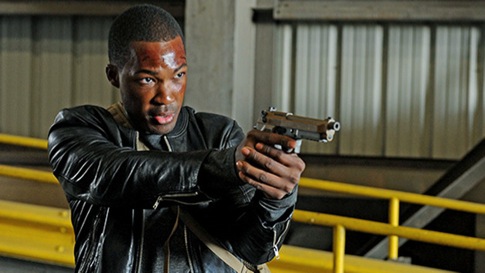
Premiering: Sunday, Feb. 5th after Super Bowl LI with another new episode on Monday at 7 p.m. (central) on Fox
Starring: Corey Hawkins, Miranda Otto, Jimmy Smits, Teddy Sears, Anna Diop, Dan Bucatinsky, Ashley Thomas, Charlie Hoffheimer, Gerald McRaney, Sheila Vand, Coral Pena, Raphael Acloque
Produced by: Howard Gordon, Brian Grazer, Evan Katz, Manny Coto, Stephen Hopkins, Robert Cochran, Jon Cassar, Kiefer Sutherland
By ED BARK
@unclebarkycom on Twitter
At its very best, 24 rocked around its clock and remains Fox’s lone Emmy winner in the Best Drama Series category.
That was for Season 5 back in 2006, when the show also logged its best Nielsen ratings. A slow decline then set in before Fox temporarily called it quits after 2014’s truncated 12-hour 24: Live Another Day.
Now that Fox’s first Jack Bauer-less 24 is upon us, another tick-tock axiom comes to mind after watching the first four hours made available for review: Even a broken clock is right twice a day.
24: Legacy, which launches after Sunday’s Super Bowl LI, is never quite that bad. But after a rather promising start, it seriously goes off the rails in Monday’s second hour with a race-against-time heist that’s preposterous even for 24.
Getting into much further detail would be a disservice to viewers. It’s no big reveal, though, to say that yet another massive domestic terrorist strike is at hand unless the new Jack (Corey Hawkins as former Army Ranger Eric Carter) can quickly come up with $2 million. Wouldn’t that seem like easy money with so much at stake? But no. So Eric takes matters into his own hands in a way that plunges 24: Legacy off a credibility cliff.
Six months earlier in Yemen, Eric and five other elite Army Rangers uncovered and killed terrorist kingpin Sheik Ibrahim Bin-Khalid, whose followers (including his son, Jad Bin-Khalid (Raphael Acloque) then declared a fatwah against them. The Rangers all were given identity scrubs and placed in the federal witness protection program. Eric and his wife, Nicole (Anna Diop), had been safely in hiding with new names until mysteriously being exposed. Only two of the six Rangers are now among the living, with the killers in search of a strongbox that had been taken from the dead Bin-Khalid’s lair. What does it have that they want? You’ll find out early in Episode 2.
24’s long-running CTU, where Kiefer Sutherland’s Jack Bauer got his start, is still in operation but without any familiar faces. Oft-vexed computer ace Chloe “Fine” O’Brian is gone and there’s a new director named Keith Mullins (Teddy Sears). The old director, Rebecca Ingram (Miranda Otto), masterminded the Ranger raid and gets a big medal for it early in Sunday’s opener. She’s otherwise left CTU to support her husband John Donovan’s (Jimmy Smits) run for the presidency. But when Eric calls out for help, Rebecca gets back in the CTU saddle. And as usual, someone is suspected of being a traitor from within.
Some viewers will recognize Otto from last season’s Homeland, in which she played duplicitous CIA station chief Allison Carr. Howard Gordon is the chief executive producer of both Homeland and 24, which accounts for Otto’s quick return to play another high level terrorist-hunter. It’s who you know -- and whether they like you.
Gerald McRaney, who’s also playing a gruff but goodly doctor on NBC’s This Is Us, does double duty as the powerful father of Smits’ Senator Donovan. His candidacy is newly imperiled with suspicions that trusted campaign director Nilaa Mizrani (Sheila Vand) could be a terrorist sympathizer.
There’s also a terrorist subplot being hatched in a high school. And if that’s not enough, Eric’s previously estranged brother, Isaac (Ashley Thomas), is a drug dealer called on to protect Nicole after their witness protection cover is blown. He still blames Eric for stealing Nicole away from him, but now has a new girlfriend named Aisha (Tiffany Hines), who’s quickly up to no good.
24: Legacy still proceeds in “real time,” with the first four episodes running from noon to 4 p.m. Fox has ordered just 12 episodes, though, so things will have to speed up soon. Hawkins is capable enough as the series’ new man of action, but the whole enterprise seems pretty played out at this point. The ridiculous center stage goings-on in Episode 2 certainly don’t help matters while the subplots further undermine what used to be TV’s most captivating page-turner.
Many potential viewers also might be combat-fatigued from the real-life daily drama spewing from the White House and Congress. The 24 franchise still takes itself very seriously and perhaps will somehow sort things out from a basic believability standpoint as time marches on. But in the first four hours, it’s too often 24: Cuckoo Clock.
GRADE: C+
Email comments or questions to: unclebarky@verizon.net
Netflix's Santa Clarita Diet offers all you can eat absurdity
02/02/17 01:30 PM

Drew Barrymore & Timothy Olyphant are the main course in Santa Clarita Diet, in which her appetites take a sudden turn for the worse. Netflix photo
Premiering: Season One’s 10 episodes begin streaming Friday, Feb. 3rd on Netflix
Starring: Drew Barrymore, Timothy Olyphant, Liv Hewson, Skyler Gisondo, Ricardo Chavira, Richard T. Jones
Produced by: Victor Fresco, Aaron Kaplan, Tracy Katsky, Chris Miller, Ember Truesdell, Drew Barrymore, Timothy Olyphant, Brittney Segal, Nancy Juvonen
By ED BARK
@unclebarkycom on Twitter
Getting grossed out by the first episode of Santa Clarita Diet is perfectly understandable.
But don’t touch that dial, or whatever else you’re touching these days. This latest Netflix original series, with all 10 Season One episodes available on Friday, Feb. 3rd, is to-die-for in more ways than its realtor turned zombie premise. Not that you should have anything close to a full meal before encountering the opening half-hour, in which projectile vomiting goes to a new level before Drew Barrymore’s central character curbs her appetite by imbibing a human. Then the fun begins in a sharply written comedy buoyed by Timothy Olyphant’s wide-grinning, goofball-ish, screeching U-turn from the dead-serious lawmen he played on Deadwood and Justified.
Sheila and Joel Hammond (Barrymore, Olyphant) are realtors by trade -- and pretty good at it. She’s kind of uptight and not crazy about his frequent pot-smoking. But their marriage is on firm ground until Sheila gets violently ill both at home and on the job. For reasons unknown she’s become clinically dead and also undead. And as a newly minted, free-spirited zombie, Sheila quickly discovers that her heightened appetite can be sated only by human flesh.
The Hammonds have a teen daughter, Abby (Liv Hewson), who soon learns mom’s secret. As does her introverted high school classmate, Eric Bemis (Skyler Gisondo). He conveniently lives next door and spends a lot of time alone with his comic books. “Always keep her fed,” Eric soundly advises.
These four core characters mesh very well together in a daringly different and exuberant concoction from Victor Fresco, whose previous off-center efforts include My Name Is Earl, Andy Richter Controls the Universe (he has a cameo in Episode 1) and Better Off Ted. Netflix made all 10 episodes available for review. In a week jammed with new series premieres, your friendly content provider watched the first five plus the season-ender to see how things are left standing.
Briefly put, nothing is really resolved in terms of Sheila finding a cure or learning how she got this way in the first place. So Season 2 is a must and almost a certainty, because Netflix hasn’t been known to leave its subscribers dangling. Viewers who make it all the way through likely will also be left pining for a return visit from guest star Portia de Rossi, who’s sensational as the very clinically mannered Dr. Cora Wolf.
Olyphant crushes his role throughout, making Joel Hammond manic and flustered without seeming to chew scenery or careen into an embarrassingly madcap cartoon character. The chewing is left to Barrymore’s Sheila, who’s bloody well good at it. Gisondo, whose character wears a “Leave Pluto Alone” t shirt in Episode 4, is appealingly nerdy but resourceful while Hewson as Abby is quick with a quip as the Hammonds’ rebellious but not bratty daughter.
There are obvious elements of Dexter in the periodic searches for suitably despicable humans to kill and the plastic wrap used in hopes of making things less messy. Still, Santa Clarita Diet very much has a comic beat all its own, with Joel reasoning that “the best prototype would be a young, single Hitler” before Sheila all but lip-smacks the line, “Man, this guy really hit the spot.”
The series also touches on whether feeling more alive as a zombie is preferable to going back to the old hum-drum basics. But without any form of a cure, is Sheila at risk of going uncontrollably feral and harming those she loves?
Santa Clarita Diet has only begun to scratch such “issues.” But humor is still its principal selling point. And once one gets past the gruesome goings-on in Episode One, it’s full tilt ahead in a crazily appetizing tale that’s easily swallowed whole.
GRADE: A-minus
Email comments or questions to: unclebarky@verizon.net
Justice with a sledgehammer on CBS' Training Day
02/01/17 10:06 AM
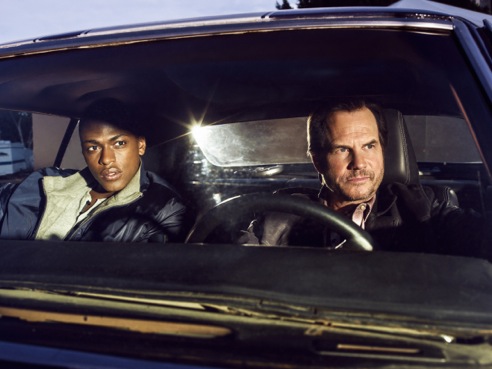
Justin Cornwell and Bill Paxton patrol L.A. in the brutal Training Day. CBS photo
Premiering: Thursday, Feb. 2nd at 9 p.m. (central) on CBS
Starring: Bill Paxton, Justin Cornwell, Katrina Law, Drew Van Acker, Lex Scott Davis, Julie Benz, Marianne Jean-Baptiste, Christina Vidal
Produced by: Jerry Bruckheimer, Kristianne Reed, Antoine Fuqua, Will Beall, Barry Schindel, Jonathan Littman, Danny Cannon
By ED BARK
@unclebarkycom on Twitter
The medical drama didn’t work, so CBS is rolling out yet another crime hour -- which probably will.
This in no way is meant as praise for Training Day, a violent, virile and often vile extension of the 2001 film that won Denzel Washington a Best Actor Oscar. It replaces the ratings-challenged Pure Genius on Thursday nights.
Bill Paxton steps in as a pale facsimile of Washington’s corrupt L.A. cop while Justin Cornwell takes on Ethan Hawke’s role as a true blue trainee. The characters’ names have been changed, as has the overall premise. This time around, Kyle Craig (Jake Hoyt in the movie) also has been ordered to spy on the very roguish Frank Rourke (formerly Alonzo Harris). The overall enforcer is deputy chief Joy Lockhart (Marianne Jean-Baptiste), who periodically drops in during the first three episodes to warn Craig that he’d better stick to that game plan or she’ll have his badge and also ruin his life.
Jerry Bruckheimer again is the principal executive producer. His fondness for corpses and mayhem has been well-documented over the years with a quartet of CSI series and feature films such as Con Air, The Rock, Pearl Harbor and Black Hawk Down. The guy doesn’t do genteel or sitcoms, although many of the situations and verbiage in his productions are unintentionally hilarious when they’re not cringe-worthy.
Paxton, as the battle-scarred, Texas-born Rourke, speaks with a comically over-baked rasp that makes Kiefer Sutherland’s old Jack Bauer character sound like Mickey Mouse. His opening narratives are a youtube compilation reel in the making.
“I’ve been hunting armed men through this city since O. J. was doing Hertz commercials,” he says for starters in Thursday’s premiere. Next week’s episode, subtitled “Code of Honor,” begins with Rourke declaring, “Most folks outside of Texas don’t give a rat’s ass about the Alamo.” But the height of ridiculosity comes later, when Rourke and his crew run out of ammo and are pinned down by a small army of drug dealers to the tune of Johnny Cash’s “Remember the Alamo.”
“I’ll tell you this,” Rourke says when things start looking real bad. “I’d rather be with you guys than Landry’s ’77 Cowboys. And they crushed the Broncos in the Super Bowl.”
The holdover members of Rourke’s crew are tough-as-nails Rebecca Lee (Katrina Law) and former surfer boy Tommy Campbell (Drew Van Acker). She’s married but they have a thing going while Rourke maintains an “arrangement” with Hollywood madam Holly Butler (Julie Benz) after burning through four marriages.
Resemblances to FX’s far superior The Shield can be taken only so far as the basic premise. Training Day otherwise has the subtlety of a carnival barker brandishing a giant stuffed panda. So meet a freewheeling villain known as Blowtorch Bob in Thursday’s premiere.
No wonder crime is up 300 percent in L.A. while arrests are way down. And no one wants to do anything about it because “they’re afraid they’ll end up on Anderson Cooper,” Rourke snarls. Presumably he doesn’t mean the annual New Year’s Eve show with Kathy Griffin, because, yeah, that would be really bad.
Craig, the still stable trainee, is happily married (Lex Scott Davis as Alyse Craig) but also still haunted by the unsolved murder of his police officer father, who was Rourke’s partner. So there’s the paint-by-the-numbers dilemma. Fingering Rourke would end the career of the one guy capable of bringing the killer or killers to trial -- or simply killing them in retribution.
Training Day also deploys a vicious monkey to get a thug to talk and a primitive “Tucker Telephone” device that gets real results when hooked to a guy’s genitals. Rourke thoroughly enjoys using it in Episode 3.
But he’s not always stone cold. Episode 2 depicts Rourke’s enduring relationship with a plus-sized Mexican kid who became a key paid informant and now wants to make some needed money for his new family by again going undercover. Absolutely no one will be surprised when this doesn’t go well.
“You dumb, fat sonofabitch. Why couldn’t you ever run faster?” growls a grief-stricken Rourke. “Walking soft was never my specialty,” he later says, hammering home the utterly obvious.
Yeah, this’ll probably be a hit.
GRADE: D
Email comments or questions to: unclebarky@verizon.net
